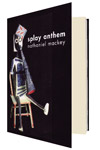In the final section of Splay Anthem, Nathaniel Mackey’s 2006 National Book Award–winning collection of poetry, the narrator and his companion arrive at a region dubbed “Nub.” As terrestrial-astral travelers, they’ve traversed numerous spaces real and imagined, exterior and interior, and have now reached a devastated landscape where “debris bumped our heads, rubble / hurt our feet.” In the book’s helpful preface, Mackey relates Nub to current political conditions in the United States and across the globe, although many of the places his liminal figures visit during the course of the book are equally desolate.
Despite the preface’s flare of political explicitness, Mackey’s poetry consistently performs a willful slipperiness that’s also hauntingly beautiful. In actuality, there isn’t a final section to the poems in Splay Anthem. There’s no beginning, either. What characters appear may or may not exist. They may be dreaming or may be awake. They may be singing ecstatic songs or dirges. The songs they sing may or may not be songs. They may not even be singing. “It wasn’t signs / we were after, we sought what signs / replaced, pitiless wish to be all / there, that it all be there… It / was a / healing song we sang had there been a song / we / sang, a soothing song.”
What can be known is that the book consists of the latest installments of two ongoing, interwoven, epic serial poems Mackey has been composing for more than two decades: “Mu” and Song of the Andoumboulou. Unlike epic poems—from ancient Greece to the twentieth century—oriented toward place and home, Mackey’s work records an experience of diasporic restlessness among African American subjects, a tidal ebb and flow of unrecuperating hope, a “movement the / one mooring we knew.” The open-ended form of “Mu” and Song of the Andoumboulou draws on a vast range of materials and knowledge; like epic poems, they universalize from mythic sources. However, Mackey’s project differs in being cross-culturally adrift between traditions and civilizations, which helps explain all the references to water, edges, and boats.
Mackey isn’t the first poet to describe the soul as a boat; such references in his work also evoke the Middle Passage: “Where we / were was the hold of a ship we were / caught / in.” If multiculturalism has in many ways aimed at claiming a space...
You have reached your article limit
Sign up for a digital subscription and continue reading all new issues, plus our entire archives, for just $1.50/month.
Already a subscriber? Sign in





